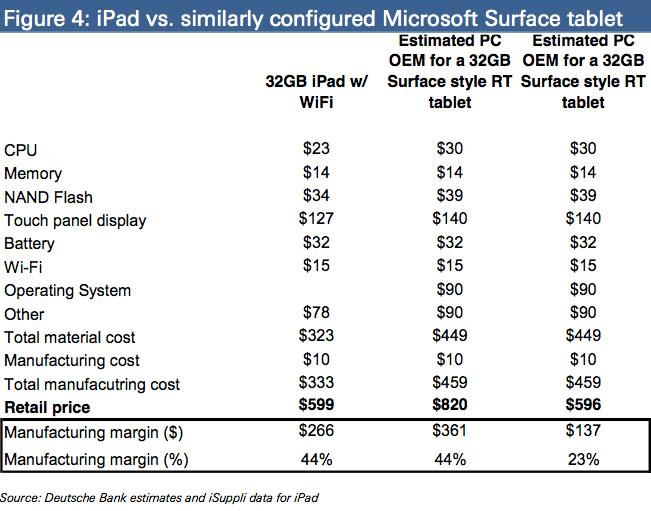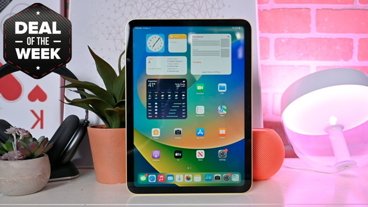Chris Whitmore with Deutsche Bank doesn't have high hopes for the Microsoft Surface tablet lineup recently unveiled by the company. In a research note provided to AppleInsider on Monday, Whitmore said he feels Microsoft is "grasping at a competitive response," and he believes that response will fall short of competing directly with Apple's market leading iPad.
In particular, he feels Microsoft has a "major dilemma" in how it will price its Surface tablets. For the low-end ARM models running Windows RT, he believes Microsoft will have to undercut the iPad on price to find any success. But in doing so, Microsoft could make it impossible for its Windows partners to compete.
Whitmore estimates that PC makers will have to price their Windows RT tablets at around $650 to generate gross margins of about 20 percent. But if Microsoft were to compete with the iPad on price, it would "collapse the PC OEM profit pool," he said.
Even then, just matching the iPad in price wouldn't be enough, Whitmore believes. Given the variety and depth of applications available on the App Store, and the amount of money many users have already spent on iOS applications, Surface tablets running Windows RT will need to be priced at a discount when compared to the iPad if they will gain any traction, he said.
As for Surface "Pro" tablets running the full Windows 8 operating system, Microsoft has said those devices featuring traditional Intel processors will be priced comparable to Ultrabook notebooks, which usually cost around $1,000. Whitmore noted that Surface tablets running Windows 8 will carry a 20 percent premium over the high-end 64-gigabyte iPad with 4G LTE, and they will likely have worse battery life, fewer third-party apps and a thicker form factor.
Still, Whitmore believes Surface models running Windows 8 are more likely to find success because they offer backwards compatibility with traditional Windows software, like full support for Microsoft Office. He said the Surface Pro has the potential to slow adoption of Apple's iPad in the enterprise, but even that would be the best-case scenario for Microsoft, in his view.
"In such a scenario, Microsoft will be swimming upstream against the consumerization of IT trend with a heavier, bulkier and more expensive product," Whitmore wrote.
He projects total tablet shipments in 2012 will reach 97 million units, growing to 124 million in 2013. He sees iPad sales exceeding 60 million this year, and growing to 74 million in 2014.
Projections from Deutsche Bank call for Apple to maintain between 60 and 65 percent of the tablet market, while Surface RT and Android tablets will struggle to gain traction.
 Neil Hughes
Neil Hughes







-m.jpg)






 Charles Martin
Charles Martin

 Malcolm Owen
Malcolm Owen
 William Gallagher
William Gallagher

 Christine McKee
Christine McKee
 Wesley Hilliard
Wesley Hilliard









209 Comments
Well, Sinosfski did say that the Pro would be priced to be competitive with the ultrabook segment. To make this work, it's unlikely MS will release Office for iPad.
If they match price, and bundle Office, it may have a chance. Or maybe they could make an OS for the iPad..
Microsoft is creating a very nice eco system, if they get a long term vision and not starting to make the windows 8 app signature bullshit and so on, maybe they have a chance, right now Android is the King, Apple is slowly loosing to Google, and the new OS Mountain Lion don't give much to already called Mac OS X Vista - Lion.
About the prices Microsoft has an advantage here, since Apple only knows expensive word, and Microsoft is know to Make 10 versions of the "same" operating system, so that will be the same with tablets, since Nokia will sell Windows 8 Tablets!!
I do think we are always thinking Apple is the best and greatest, but if we see the last numbers, stock markets and iPhones/Macs sell, things are not looking so good as once did.
Well, Sinosfski did say that the Pro would be priced to be competitive with the ultrabook segment. To make this work, it's unlikely MS will release Office for iPad.
That is another dilemma for Microsoft. Will they make more money selling their pro tablet than they would if they sold millions of copies of Office for iPad?
What if the price to compete with the Air? Too me, it seems the surface will compete in that market with tablet as a secondary. I, right now am torn between a new tablet or a ultrabook. At home I love the simplicity of my iPad 1st Gen but on the road I need horsepower. This may be right up my road and I see not having to own two devices which would cost me around $2000.